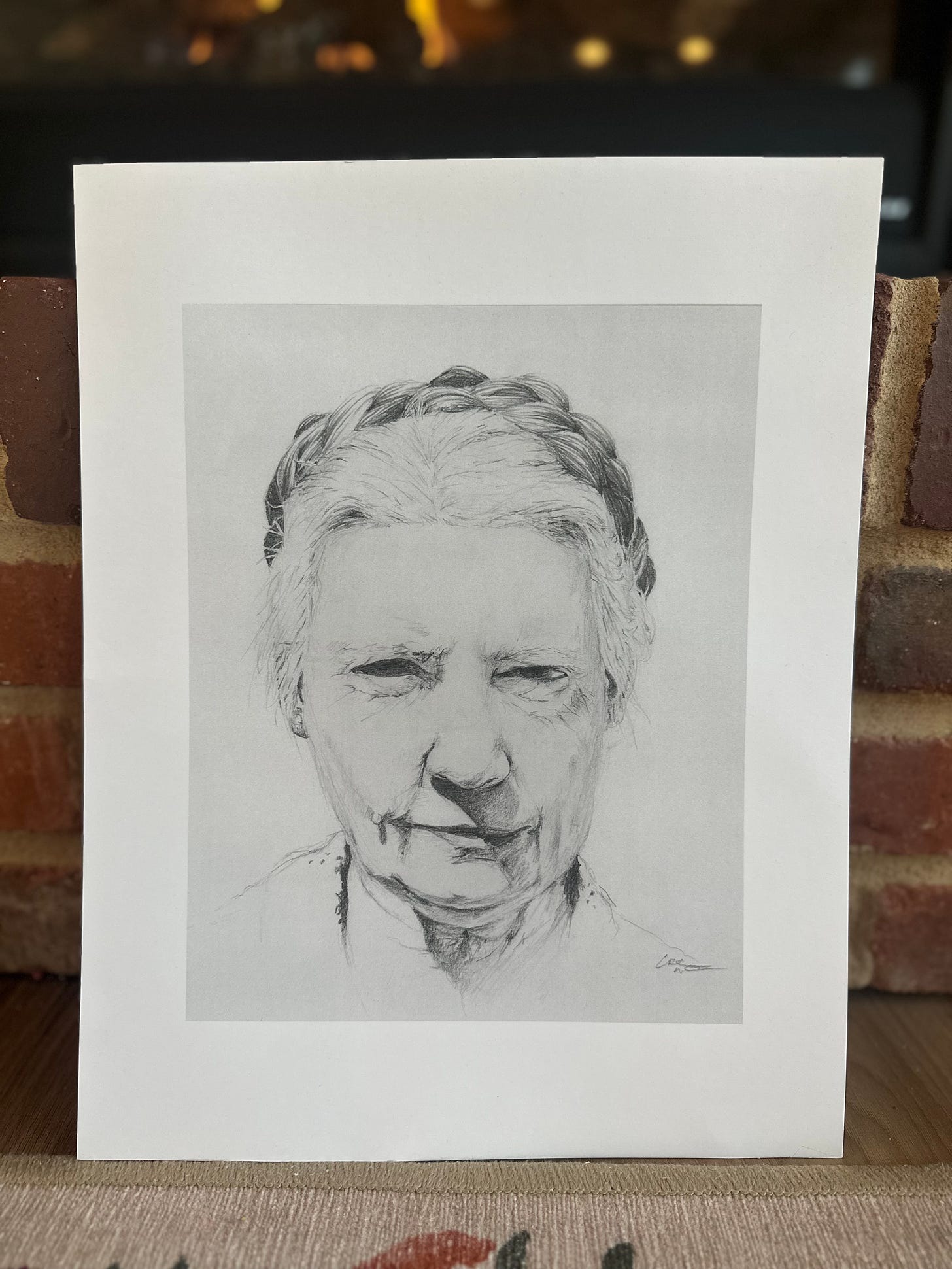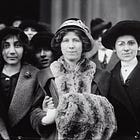I usually only scribble one free letter a month, but in honor of m’girl Dorothy, this one’s free as well—I know she would’ve insisted. 😉 The only reason I can do so is because of our paying subscribers. If you’re sick of hot takes, hashtags, and petty political arguments, or if you’re simply looking to cultivate an online reading experience that doesn’t raise your blood pressure but encourages you to use your brain and heart in tandem, I think you could find a digital home here and would encourage you to prayerfully discern upgrading your subscription.
It’s no secret that Servant of God Dorothy Day is one of my favorite Catholic figures.
I’ve written many times about my love for this woman, and we even did a summer read-along on her memoir in 2023. If you’re new here, Dorothy Day (1897-1980) was a social activist and prolific writer. She was the founder of the Catholic Worker, a home for those seeking refuge who wanted to participate in a vision of “workers becoming scholars and scholars becoming workers”. The Catholic Worker movement is now much larger and unrulier than Day ever intended, but her original spirit is still there, pulsing through the homes that are willing to open their doors.
The Catholic Worker Movement can officially trace its beginnings to May 1, 1933. That day, Dorothy and three others began distributing a newspaper in Union Square. The paper was entitled The Catholic Worker, and it spoke about the plight of the worker as a matter of justice. It braided together the corporal and spiritual works of mercy, reminding Catholics of the call to care for their neighbor in both body and spirit.
There’s so much inspiration I could take from Dorothy: the way she gave time to her writing, the way she cared for whoever was in front of her no matter the cost, the way she refused to be stuffed into a political box, the way she was unafraid to change her mind, the way she insisted upon the sacraments even when others thought she was being too pious or pushy. Dorothy Gave Zero Shits, is what I’m saying.
But it’s in Dorothy’s imperfections that I think I’ve learned the most.
As part of a Catholic Worker book club, I had the unique opportunity to see some of Dorothy’s original writings and hold them in my hands. I really can’t explain the feeling of holding Dorothy’s prayer journals from retreats, or letters to her brother, or notes to co-founder Peter Maurin. Catholics are very physical in nature and to hold the items Dorothy once held connected us deeply. But I was most struck by letters she’d written to her ex-lover and the father of her child.
Dorothy became Catholic shortly after having her daughter Tamar. Tamar’s father was an atheist biologist who Dorothy was madly in love with most of her life. He did not respect her faith—or, in my opinion, her—and their love didn’t last. Dorothy never married, but she and Tamar’s father stayed in touch. And you can see in her passionate writings how deeply she missed him.
I felt as if I were peering into someone’s underwear drawer, almost. It was so intimate. Asking him to return. Telling him how much she missed him. Promising she wouldn’t try and convert him. Bartering and bargaining and begging.
You could see in her writings that Dorothy didn’t like this part of herself. She didn’t want to be hung up on an atheist who was furious she’d baptized their daughter. But it was in her tightly—a piece of herself she struggled to hang on the cross.
Dorothy had many other flaws as well. Her mothering: that’s a hard one for me, when you read about how often she left her daughter and the trauma Tamar endured growing up in such a chaotic, unstable environment. Her disorganization. Her willingness to put men and women with addictions together under one roof, and the risk of violence that entails. Her charity in words didn’t always match her charity in serving (she could be a more than a wee bit snippy). And the fact that she fought for women to have the right to vote, only to insist upon not voting herself, makes me shake my head1.
What I’ve learned from this is this: our work doesn’t need to be perfect to be good.
Our work doesn’t need to be efficient to be good.
And our work doesn’t have to be right for everyone to be good.
Dorothy was, in many ways, a mess. She didn’t simply convert and instantly become a saint, free of flaws and failures. And yet her legacy has positively impacted millions. From the person she gave soup to on a freezing January day to the volunteer who’s reading this as they schlep down to their local Catholic Worker. Dorothy’s humanity was very apparent—she was not a pure, spotless being. But she didn’t let that stop her. Dorothy didn’t look at her own errors and say who the hell am *I* to do this work? She might have thought it. But she didn’t let it stop her.
What if she had?
Dorothy believed in doing the small thing, right in front of her. I recently saw a quote floating around on Instagram that said, in essence, that in times of trial, do for one person what you wish you could do for everybody. Friend, you are not going to solve the complex issues of the world that are causing homelessness and poverty. At least, not today. But you can do one small thing today. One ten dollar donation. One dropped-off box of old baby clothes. One email to the domestic violence shelter to ask about volunteer requirements. One rosary for the poor. One choice to shop small, or fix what you have instead of shopping at all.
We are so far from sainthood, but of course we are. To waste time on self-pity over that would be ridiculous. We are desperate for God’s goodness because the strength of our sin is so powerful. We can do nothing good without him: and that’s a good thing. We are made in his likeness and image, and little by little, we can beat back darkness in our own imperfect ways.
My mom told me recently that she joked to someone “I mean, she ain’t a saint” when they were talking about how they enjoyed the newsletter. And it’s so true. You guys don’t even know my cuss words, my gossip, my anger issues (I had to walk out of a school board meeting last week before I yelled at someone, and I am not exaggerating. I literally had to remove myself from the room). But I don’t think any of that surprises God. He knows that I’m a mess, but I’m his mess: ready and waiting to be a tool in his hands. Conversion or public ministries do not perfect us. What perfects us is Jesus’ grace making up for all of our boneheaded moments. That’s what makes us priests, prophets and kings.2
My favorite saints are the ones with skeletons in their closets and crumpled-up notes in their junk drawers. They’re the most relatable, and the ones who inspire me. Because if they could still fight tooth-and-nail to be like Jesus past every imperfection, it gives me hope that my ridiculous self can as well.
I’m so thankful that 92 years ago today, Dorothy and a few friends went and handed out newspapers for a penny. I’m so thankful they laced up their shoes and shouted about migrants and the poor and healthcare. They could have looked around at the mess the world was in and absolutely passed out from fear (1933, guys. What a time to be alive.) But they didn’t. They offered the smallness they had, knowing that God could use it for greatness if he so chose.
And I’m so thankful that he did.
Servant of God Dorothy Day and Peter Maurin, pray for us!
“I really only love God as much as I love the person I love the least.”
― Dorothy Day
On My Nightstand
Encore Provence by Peter Mayle: I can’t believe I’m finally going to Provence this October—eek! I’m rereading all of Peter Mayle’s wonderful books about the south of France to mentally prepare. If you’ve ever daydreamed about living in a small town (a la Belle—there must be more than this provincial liiiiife) and eating seasonally and dealing with grumpy French neighbors, you will love these short little memoirs.
The Dream Keeper and Other Poems by Langston Hughes: I love all of Hughes’ work but this poetry collection is my favorite. It was a great companion during National Poetry Month in April!
Are “Tradwives” Part Of Our Past Or Our Future—Or Neither?: Fantastic piece challenging the “traditional” nature of “tradwives”.
In case you missed these Letters:
Did you know I have another newsletter?
It’s true! Coffee With Claire is my free monthly newsletter about all things writing + publishing. It’s the best place to stay up-to-date on my fiction projects (I have three books coming out in 2026!) and chockfull of book recommendations. See you there!
Even when I’ve voted third party—which is the vast majority of votes I cast—I always do so as a nod to Susan B. Anthony, Alice Paul, and the thousands of other women who fought for me to have that right.
https://www.catholic.com/qa/how-are-we-priests-prophets-and-kings












I really appreciate this piece! It’s been hard for me to get through her writing, but I keep meaning to- literally on my bedside table at the moment. (I do read “Dorothy and the Great Quake” regularly because my kids love it, so that’s something) I’m similarly of two minds about her sometimes- for example, on the one hand, when women are often measured in holiness by their “kid outcomes output”, it’s encouraging in some ways that she’s a Servant of God despite her descendants not being Catholic, but on the other, her difficulties as a mother are hard to confront. I’ve also had some bummer experiences with Catholic Worker and wish they were perhaps more open/collaborative. (And yes, collaboration across “party lines” should be better everywhere along the spectrum.) When I lived near a military base, I really wanted to be involved with the local CW group but their primary activity at that time was protesting the base… was not particularly welcome as a military spouse. However, I did just check back and that area has a house of hospitality now, homeless services program, etc which I would have loved while I was there!
The phrase that made my day: Dorothy Gave Zero Shits